Jeep Avenger review
By the time Jeep's first electric vehicle, the Avenger went on sale it had already been decorated with the titles such as “European Car of the Year 2023” and “Women’s World Car of the Year”. But is there substance to these awards or is this just a case of Jeep leveraging a few PR connections. Our review aims to find out if the Avenger truly stands above its competition.
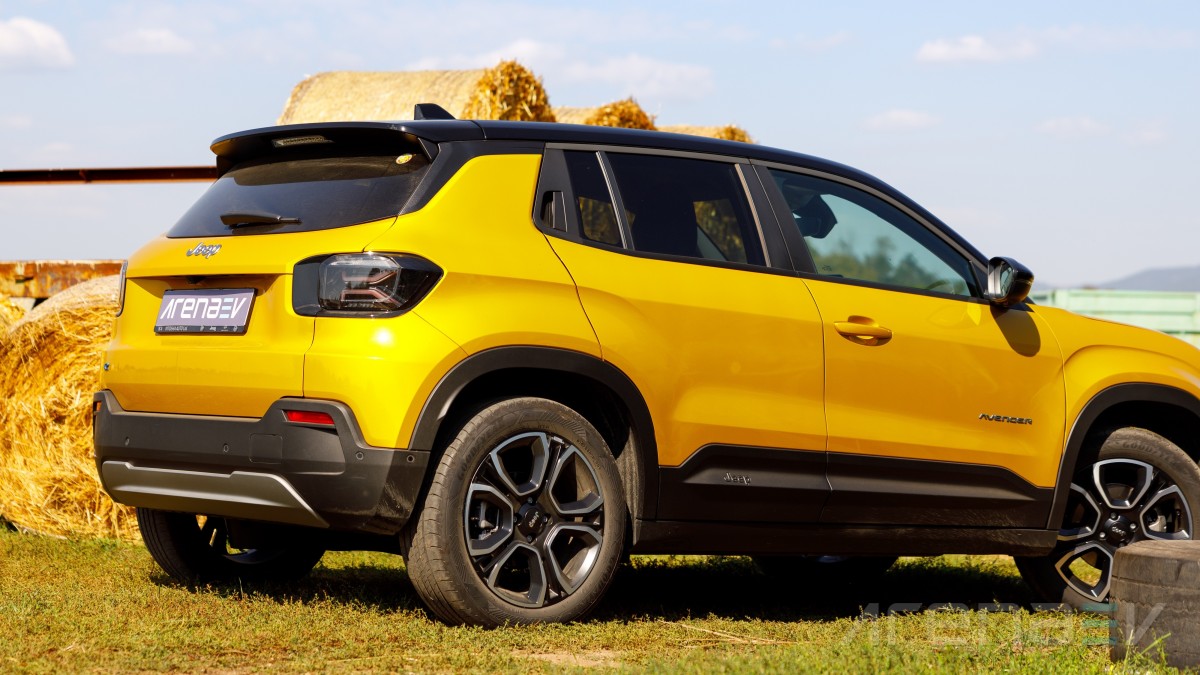
The Jeep Avenger is a small SUV with FWD and a 54 kWh battery. It fits in the segment of the most popular vehicles on the planet right now, which means it will face some fierce competition both from its Stellantis stablemates and other makers.
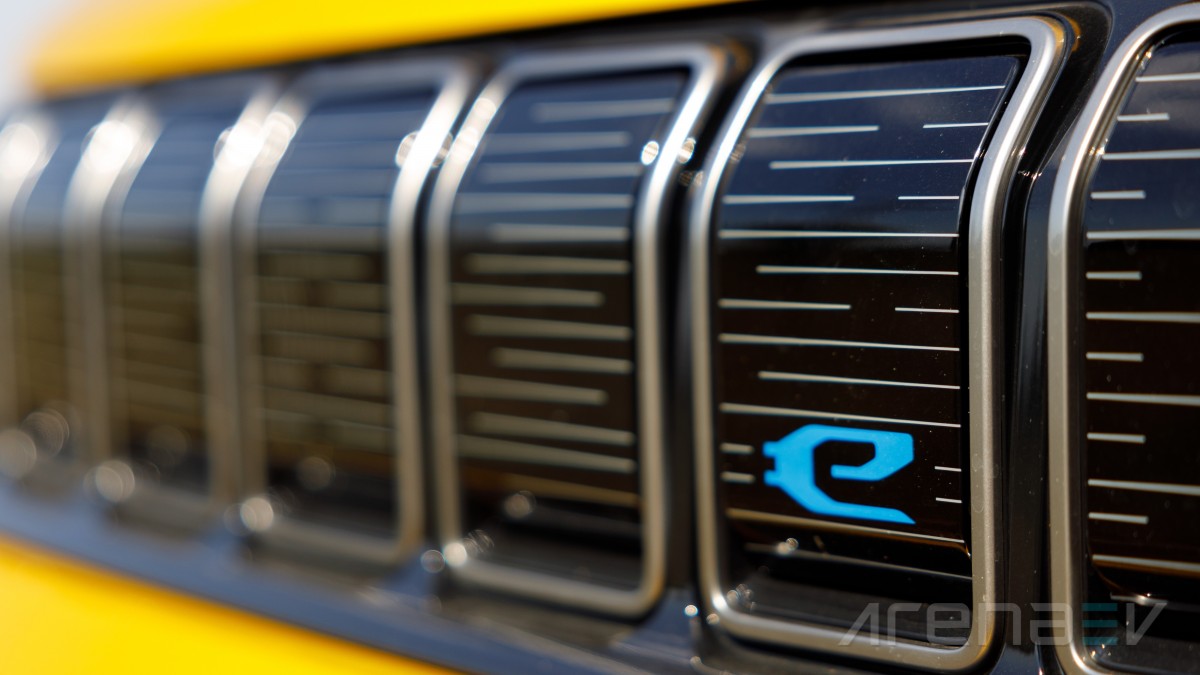
It is Jeep’s first purposefully built vehicle for Europe as the brand finally wants to make itself more recognizable on the Old Continent. While sharing its base with the Peugeot e-2008 and Opel/Vauxhall Mokka-e, Jeep tweaked the platform enough that the Avenger feels different and unique. However the platform itself also underpins internal combustion counterparts, which leads to some compromises in terms of construction.
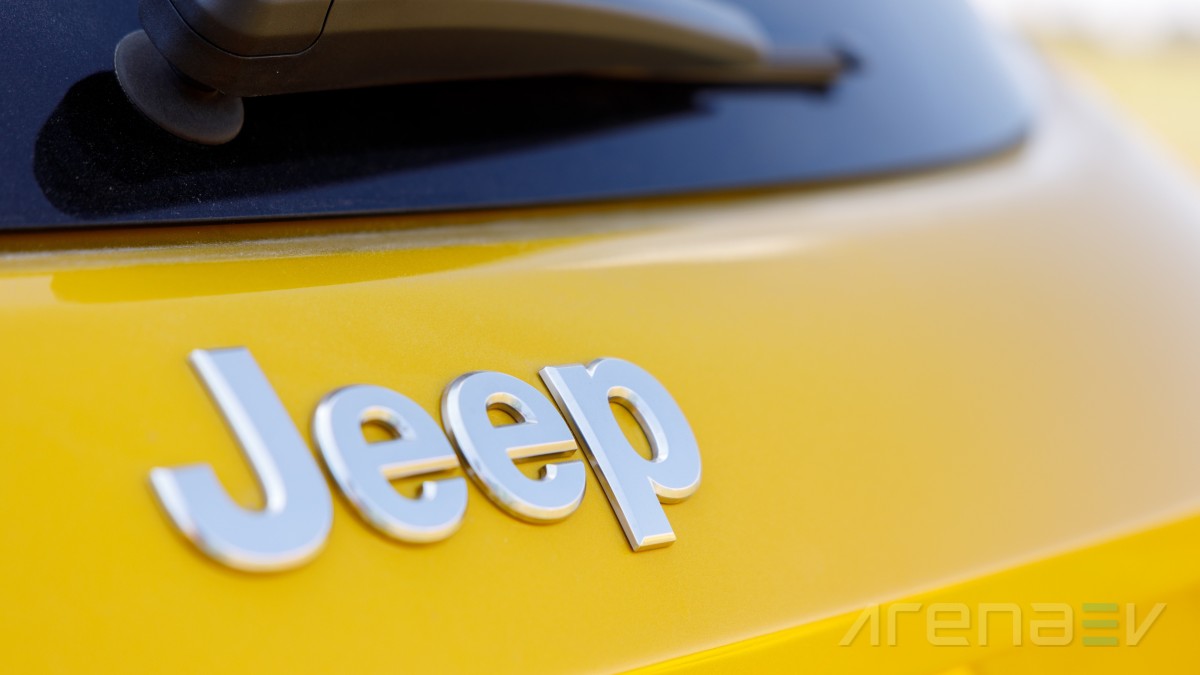
As a fun fact this is not the first car named Avenger. Dodge offered a small sedan of the same name from the mid 90’s all the way to the teens. It was a popular, but not remarkable vehicle. The new Jeep Avenger seems to have much higher hopes for success and public perception.
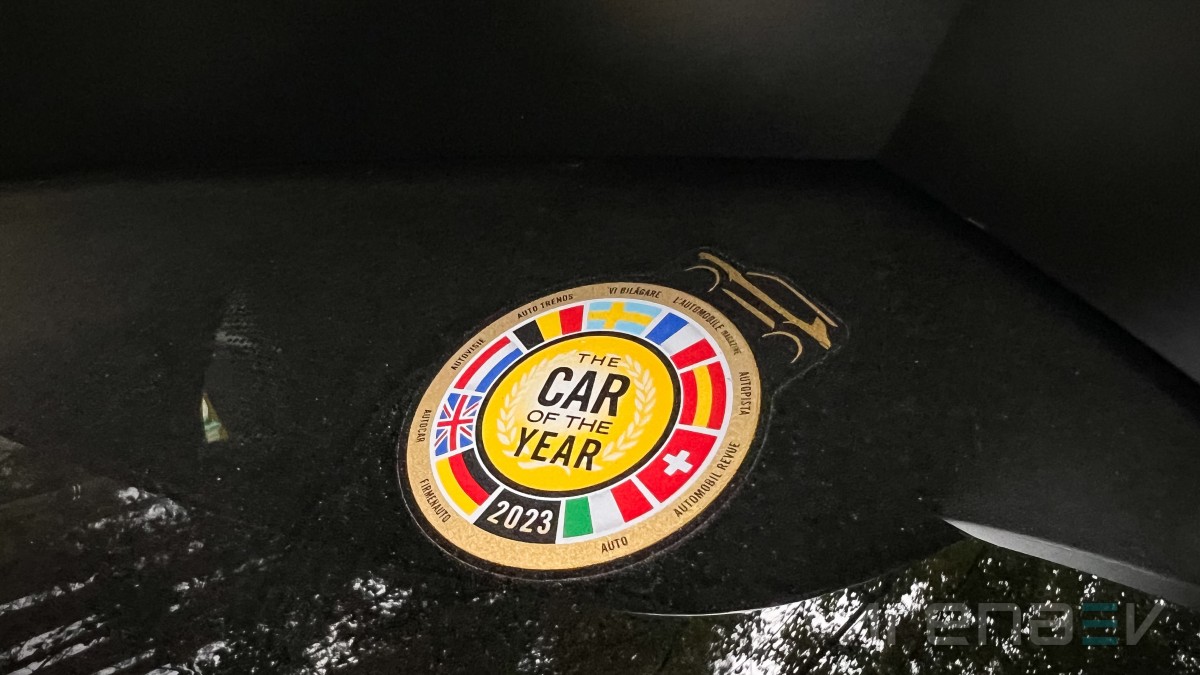
The Jeep Avenger is small, electric and FWD, which seems sacrilegious for hardcore Jeep enthusiasts, but it actually carries on some of Jeep’s greatest qualities. It has great ground clearance of 7.9 inches and short overhangs, which means it's not afraid to leave the paved roads.
- Dimensions: 160.6 inches x 70.1 inches x 60.2 inches, 100.9 inches wheelbase.
- Drivetrain tested: FWD 115 kW (156 hp), 192 lb-ft, 54 kWh total battery capacity; 51 kWh usable.
- Charging: 100 kW CCS; 20-80% in 24 min.
- Range: 249 miles WLTP
- Weight: 3,386 lb unladen
- Other features: Easter eggs, off-road modes, autopilot.
Exterior
On the outside, the Avenger is instantly recognizable as a Jeep. It has the signature grille with 7 slots. It has been a feature of all models so far and symbolizes how the brand was the first to conquer all 7 continents. In the Avenger, its only purpose is styling, since unlike ICE vehicles it doesn't need the engine cooling enabled by the ample slot.
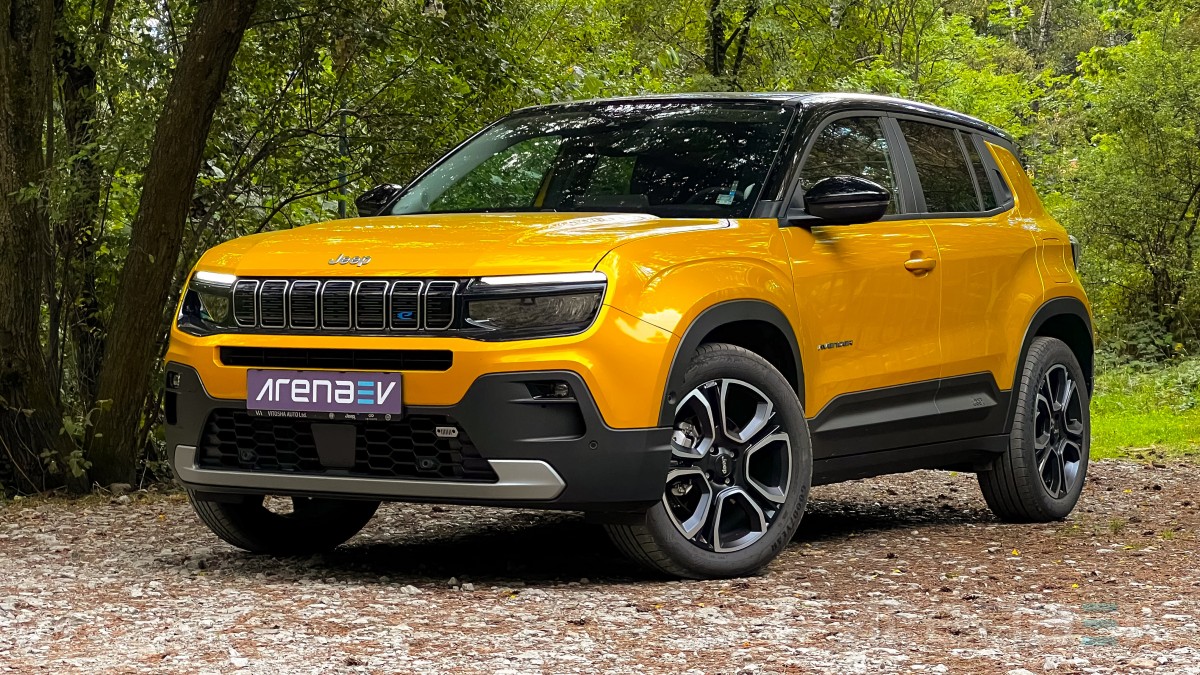
The headlights look aggressive with their big housings and thin LED strips for the daytime running lights. The angry-looking front end is further enhanced by the black plastic bumpers, which go around the whole vehicle, creating a more rugged appearance.
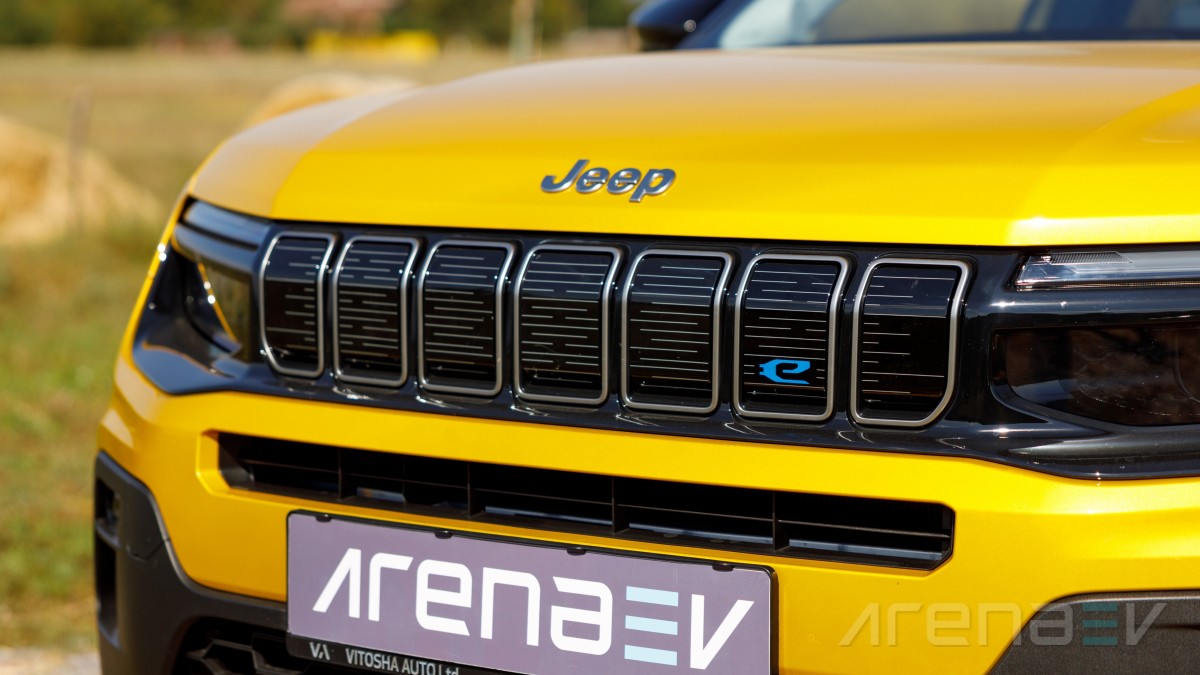
Moving on to the side, it has a similarly solid appearance, once again primarily due to the black bumpers. The 18-inch wheels on our test car are fitted to Goodyear Efficient Grip Performance 2 tires in size 215/55/18.
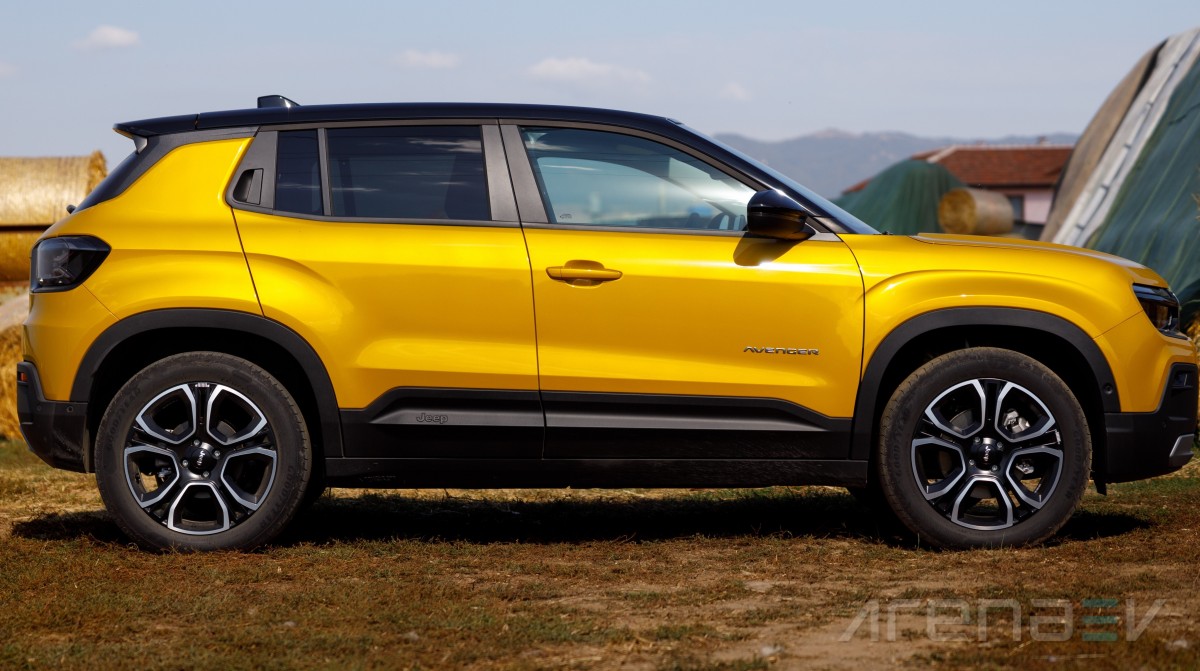
A distinct feature of the Avenger are the rear door handles, which are hidden inside the door pillars, making it seem like it’s a coupe and clearing the design off of unnecessary interruptions.
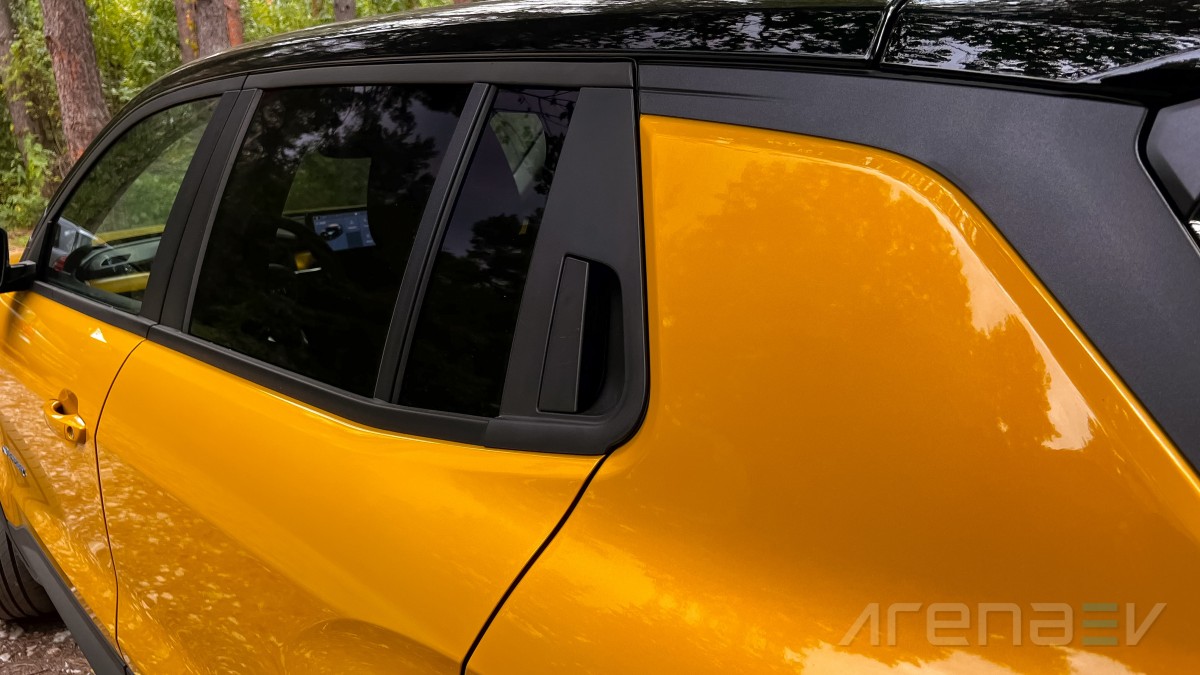
The great approach and departure angles make the best use of the 20 cm ground clearance, allowing you to get over obstacles many other SUVs wouldn’t.
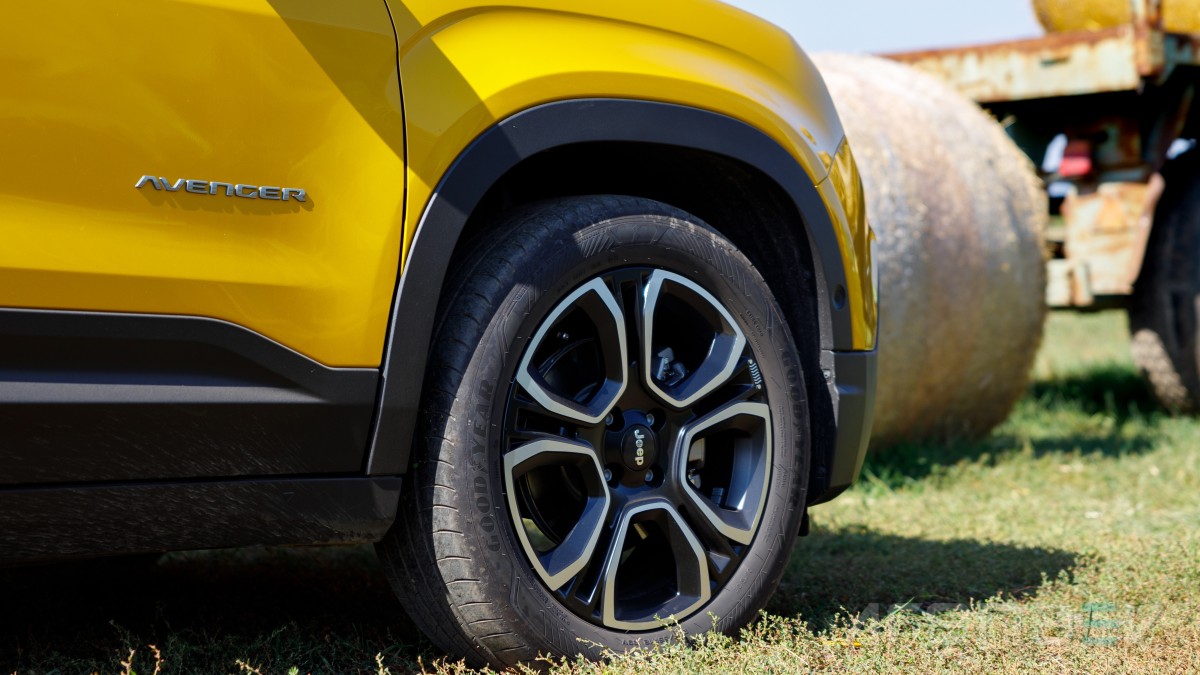
The rear end of the Jeep Avenger looks massive and makes the vehicle look big, even though it really isn’t. The big and wide tail lights with aggressive LED design and the plastic bumper make the Avenger look taller and wider than it actually is. Still, standing at 4080 x 1780 x 1530 mm (160.6 x 70.1 x 60.2 in) the Avenger is actually pretty tiny, and a much better fit for city driving than highway cruising.
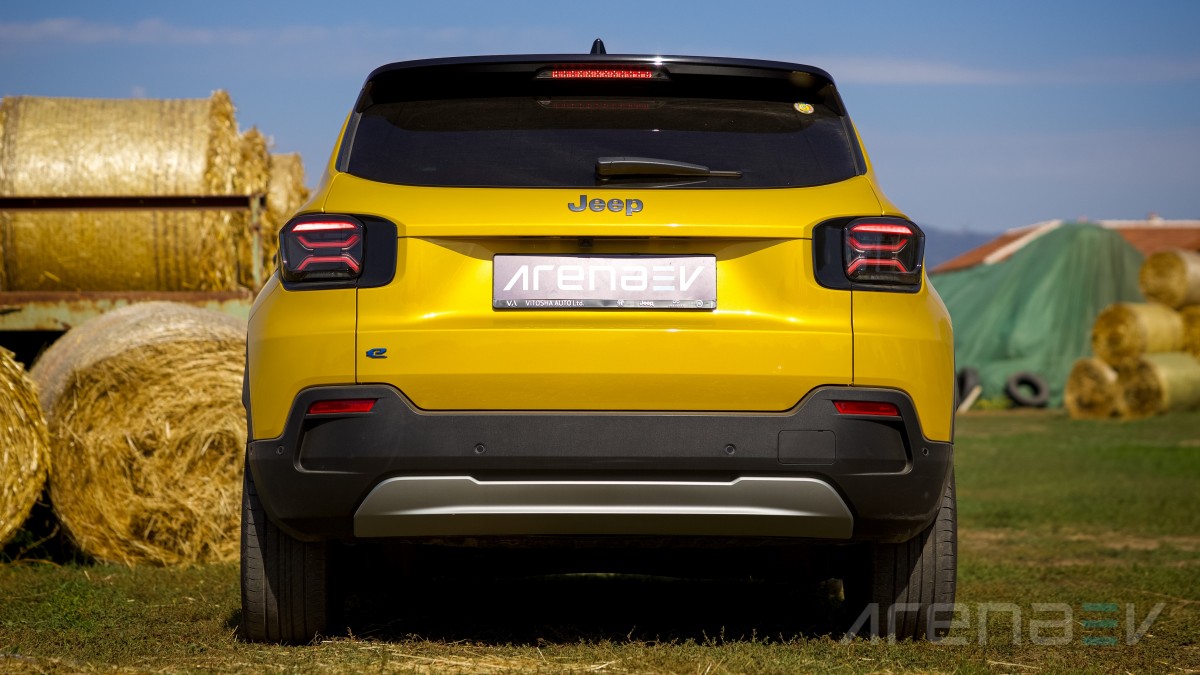
A great feature not many vehicles in this price range have is the electrical tailgate, which can be opened by sliding your foot underneath it. This helps tremendously with groceries and heavy items and is a real convenience for those grocery shopping trips.
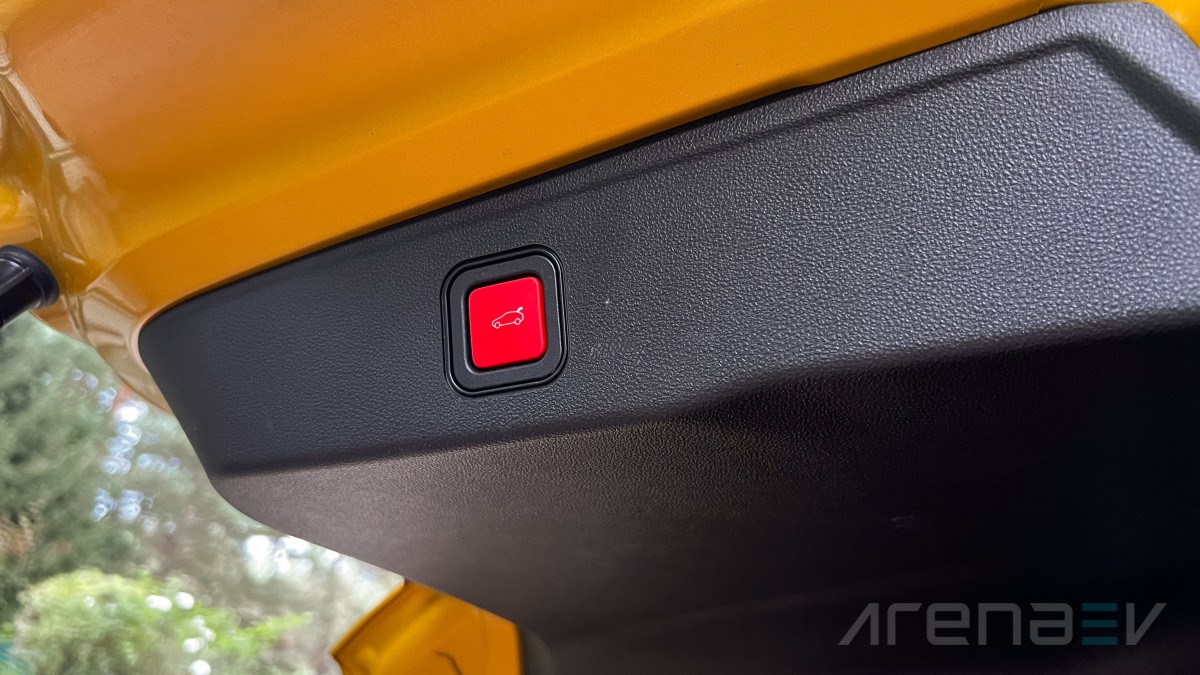
The whole exterior of the Avenger is filled with “easter eggs”, which make the design that much cooler. The windshield has a child stargazing on one end and a constellation on the other, while all wheels have an insert with the Jeep grille. The front radar system is hidden behind a compass, which makes this otherwise ugly element appear interesting. The rear hatch has a Jeep grille hidden above the third brake light, which you will hardly ever notice. More notable is the mountain range on the rear window, which you constantly see in the rear-view mirror.


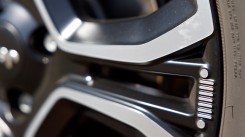
Here are some of the Avenger's most notable "Easter eggs".
Interior
We found the inside of the Avenger far less exciting. The interior is very traditional and the only quirky detail is the giant plastic yellow bar that goes from end to end on the dashboard and incorporates the ambient lighting. It can either be yellow, gray or black, depending on the trim level you choose.
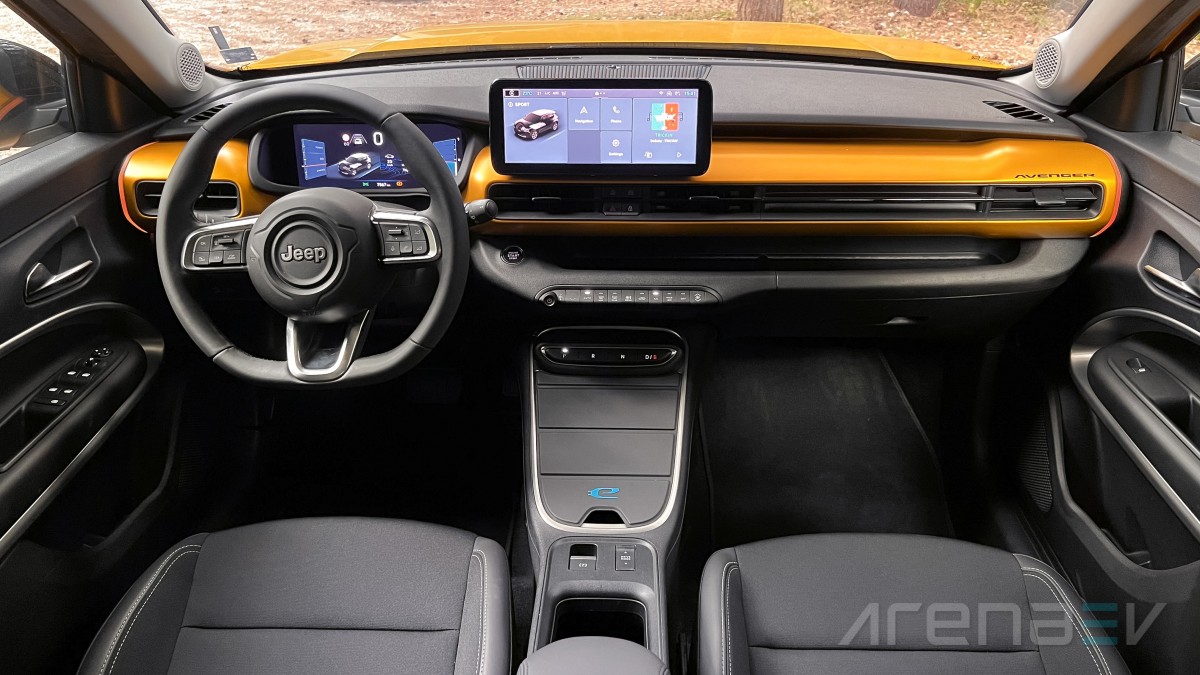
The build quality is good and there are hardly any creaks and rattles while driving. However you get a low of cheap plastic and generally unimpressive materials. The whole thing feels like a parts bin from other Stellantis models, which it practically is, and hardly makes you feel great.
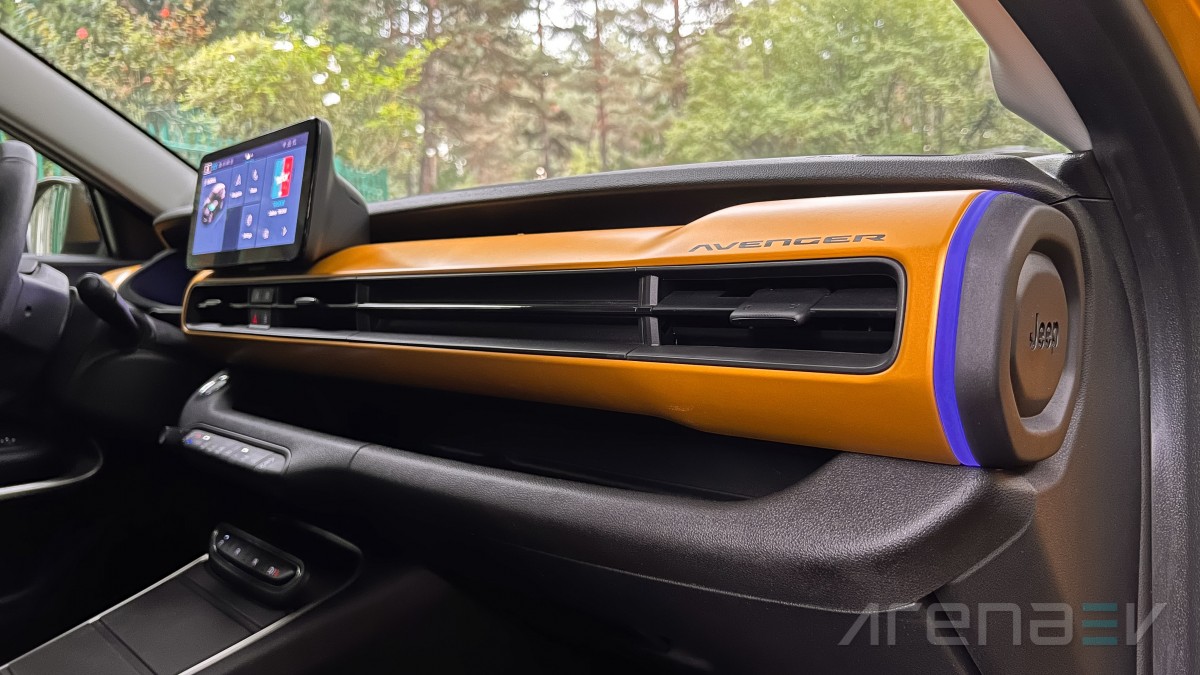
The steering wheel and the yellow bar seem to be the only unique elements in the layout of the Avenger. Even though the wheel resembles that of the current Jeep Wrangler, it has its own button configuration, which is really good and intuitive. The buttons are nicely tactile and large, which makes them easy to use.
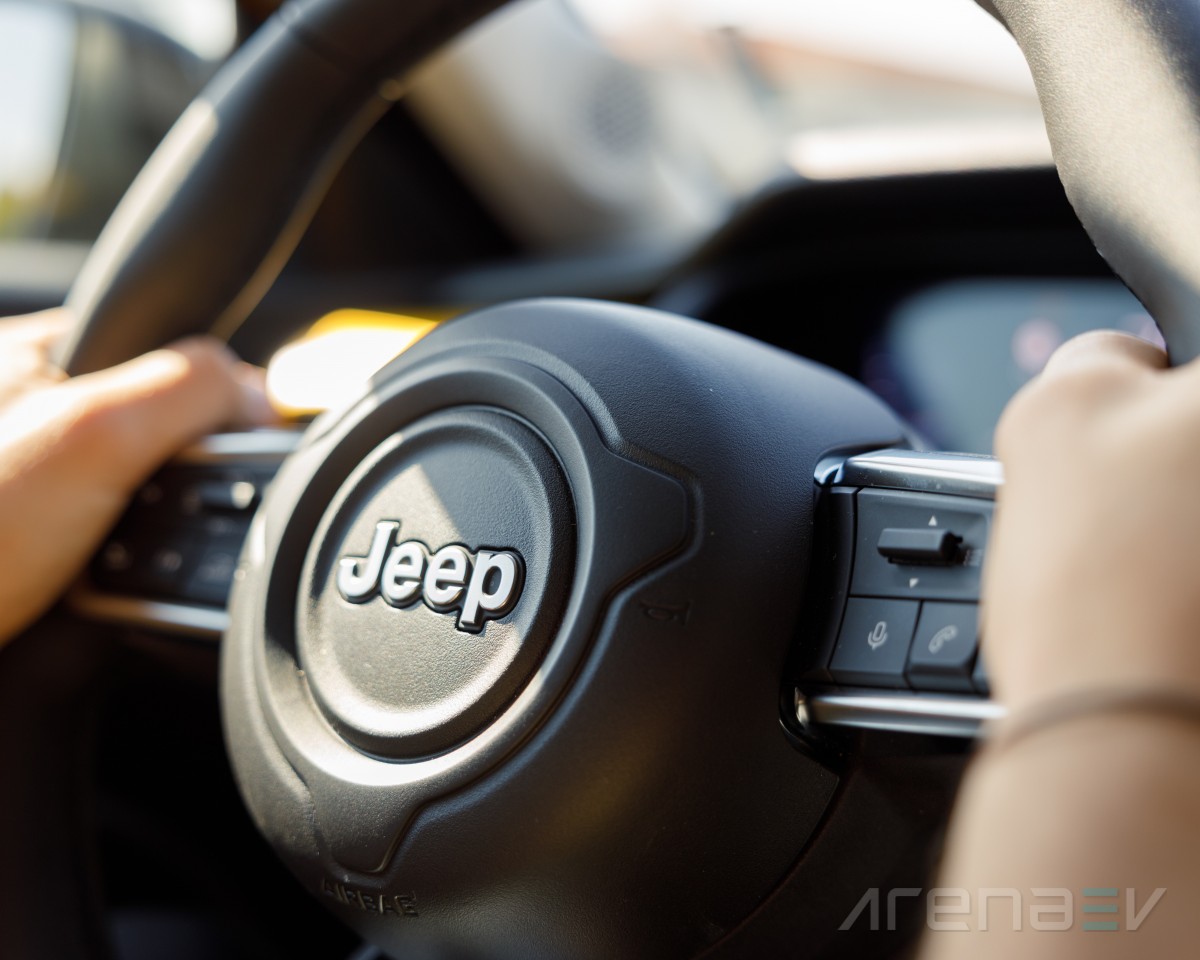
Behind the wheel is the gauge cluster, which is a big display with great usability. It has a nice big font, which is easy to read and offers many different menus. You can pick from many different layouts and it's all very easy to control with just two buttons at the ends of the two stalks behind the steering wheel.
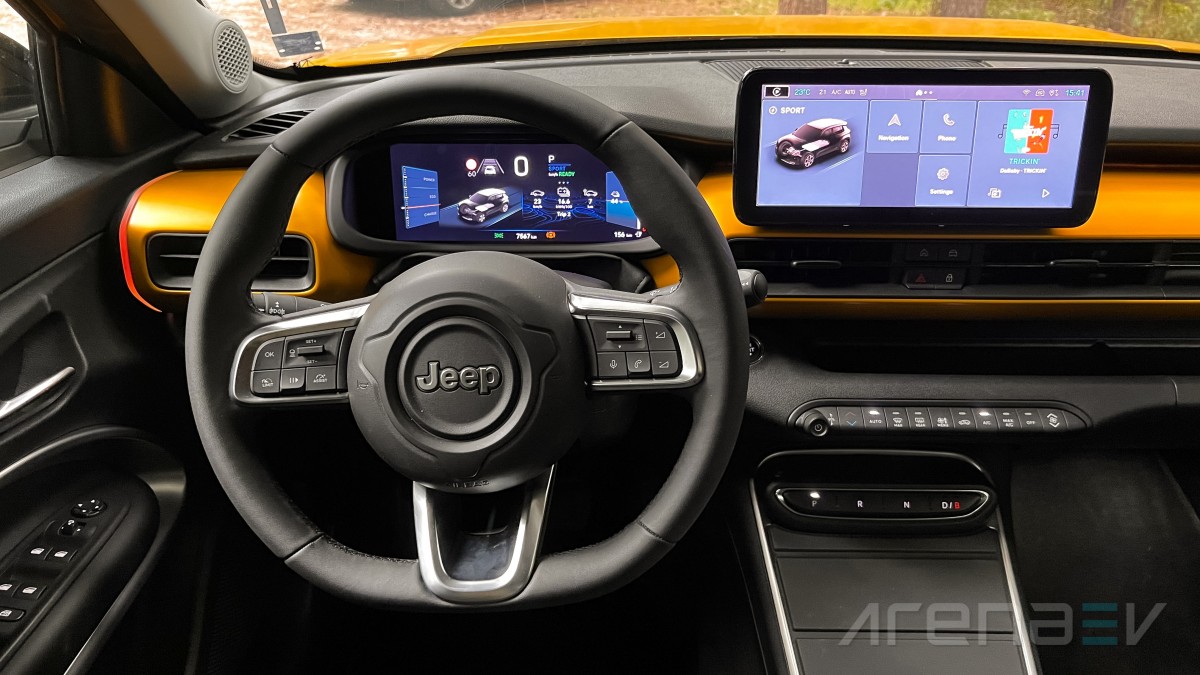
The center display is directly borrowed from other Stellantis models like the Fiat 500e and the supercar Maserati MC20. The size of 10.25 inches makes it relatively small by today’s standards, yet it offers a lot of modern features and the responsive touchscreen makes it a pleasure to use. Its only real inconvenience is the fact that some of the readouts and icons are very small, making them hard to use.
Below the screen there are 4 buttons. The top left one brings you to the home screen of the center display, while the top right shows the vehicle settings and active systems. The lower row includes the hazard lights and the door locker, which is a very convenient integration.
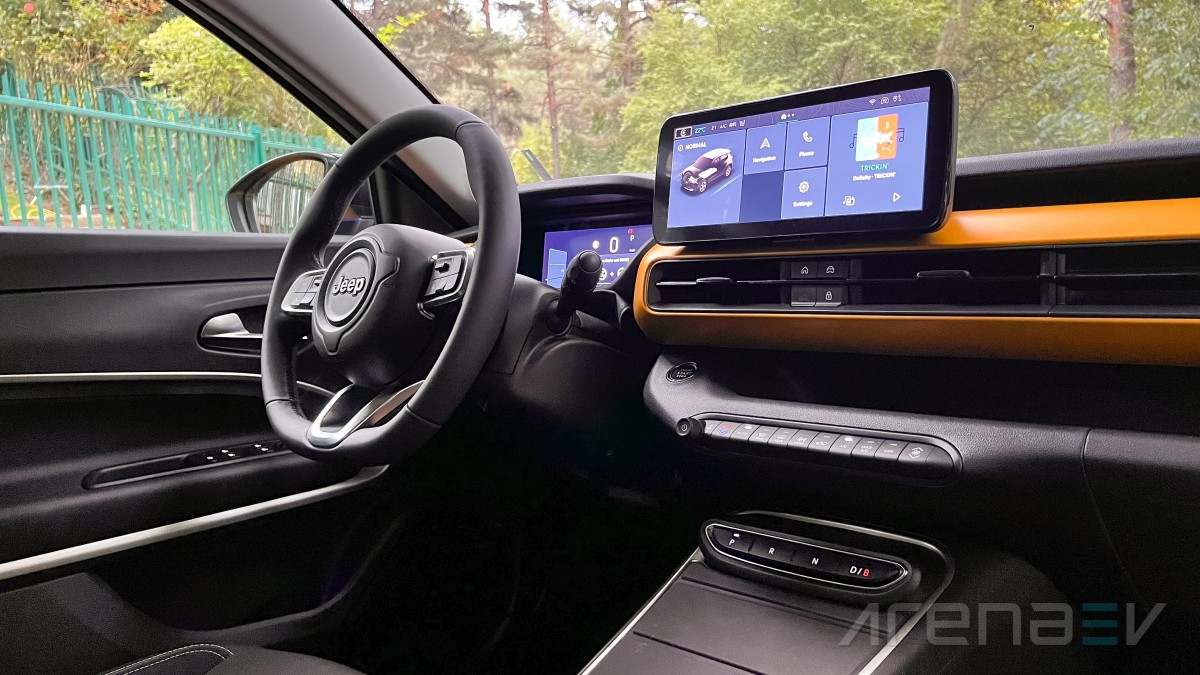
Below the giant yellow bar you can find a huge storage area, but it doesn’t close, severely limiting its usability. Some small items you frequently use and don’t mind rolling around is the best you can put there.

Underneath this storage area are the climate controls, and even further below them are the gear selector buttons. The layout is identical to the Fiat 500e's, but in the Avenger the materials are far worse and using them doesn’t feel as premium as in the 500e. The engine start button is a similar story - the piano black in the Avenger looks far less impressive than the glowing crystal-like key on the Fiat.
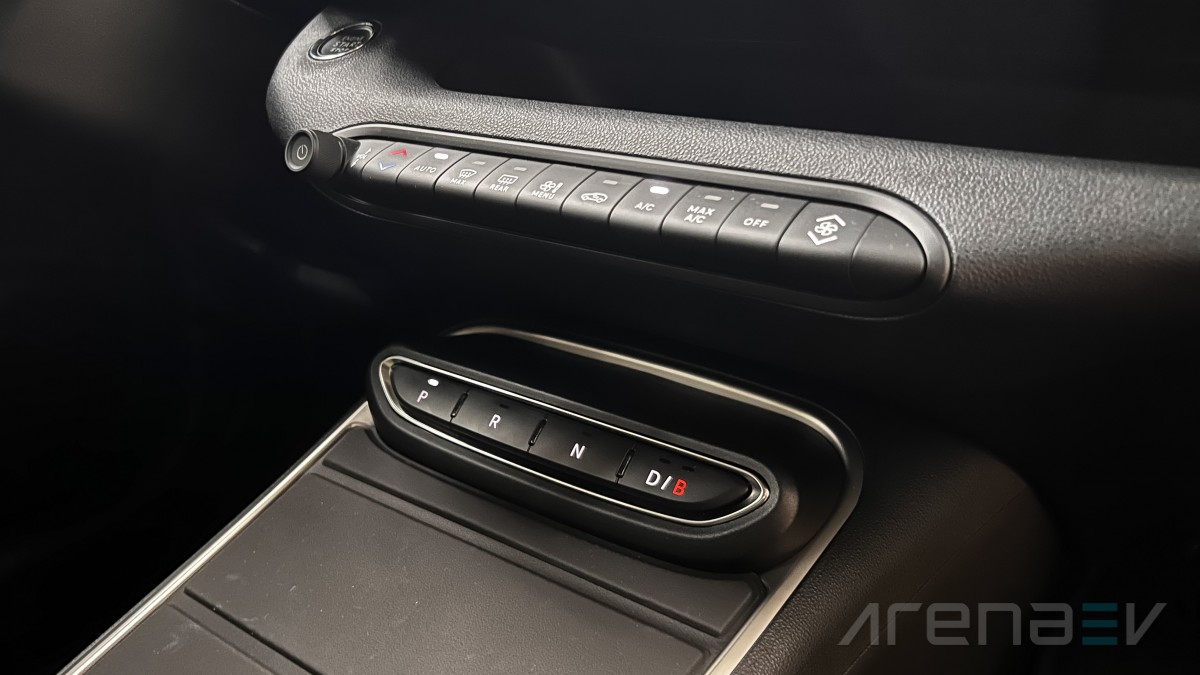
The center console between the driver and the passenger is also lifted straight from the 500e and has the rubber cover, which looks exactly like a tablet case. It hides a big storage area with multiple charge ports for your gadgets. The back side of the center console contains the movable cup holders and the armrest.
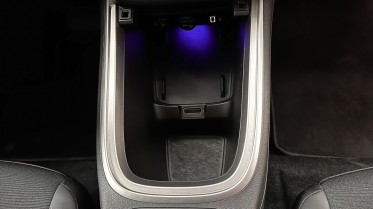
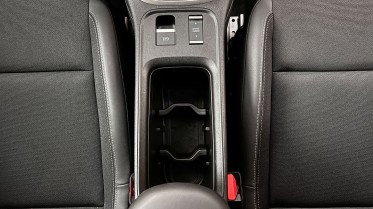
There is a lot of storage room between the front seats, which is very useful for small items.
The seats in the Avenger are completely average with slight bolstering and a high driving position, which is exactly what the majority of buyers in this segment look for. They are comfortable and highly adjustable. The vegan leather on the outside of the seats is a fine touch and the cloth inserts make entering the car on those hot summer days much more bearable.
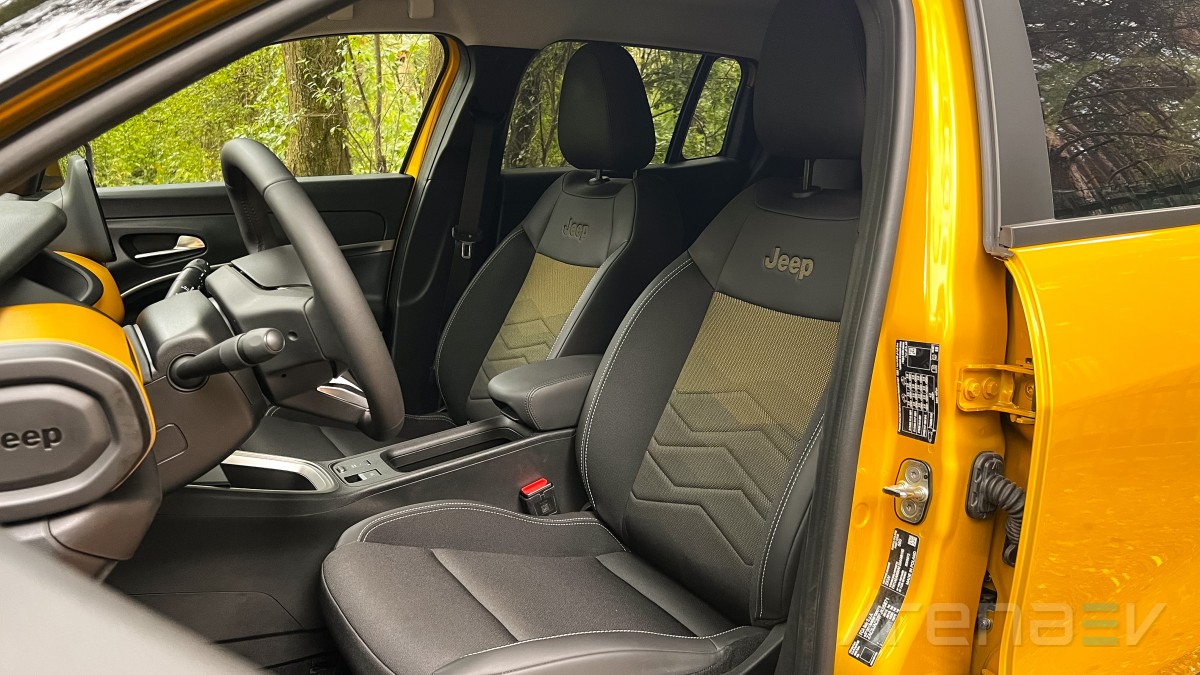
The rear seats offer little of interest beyond the two charge ports for the rear occupants. There are no high-mounted climate vents or climate controls or even a rear armrest. The rear of the Avenger is seemingly not intended for frequent usage, and with the very little legroom passengers won't have the most comfortable ride either.
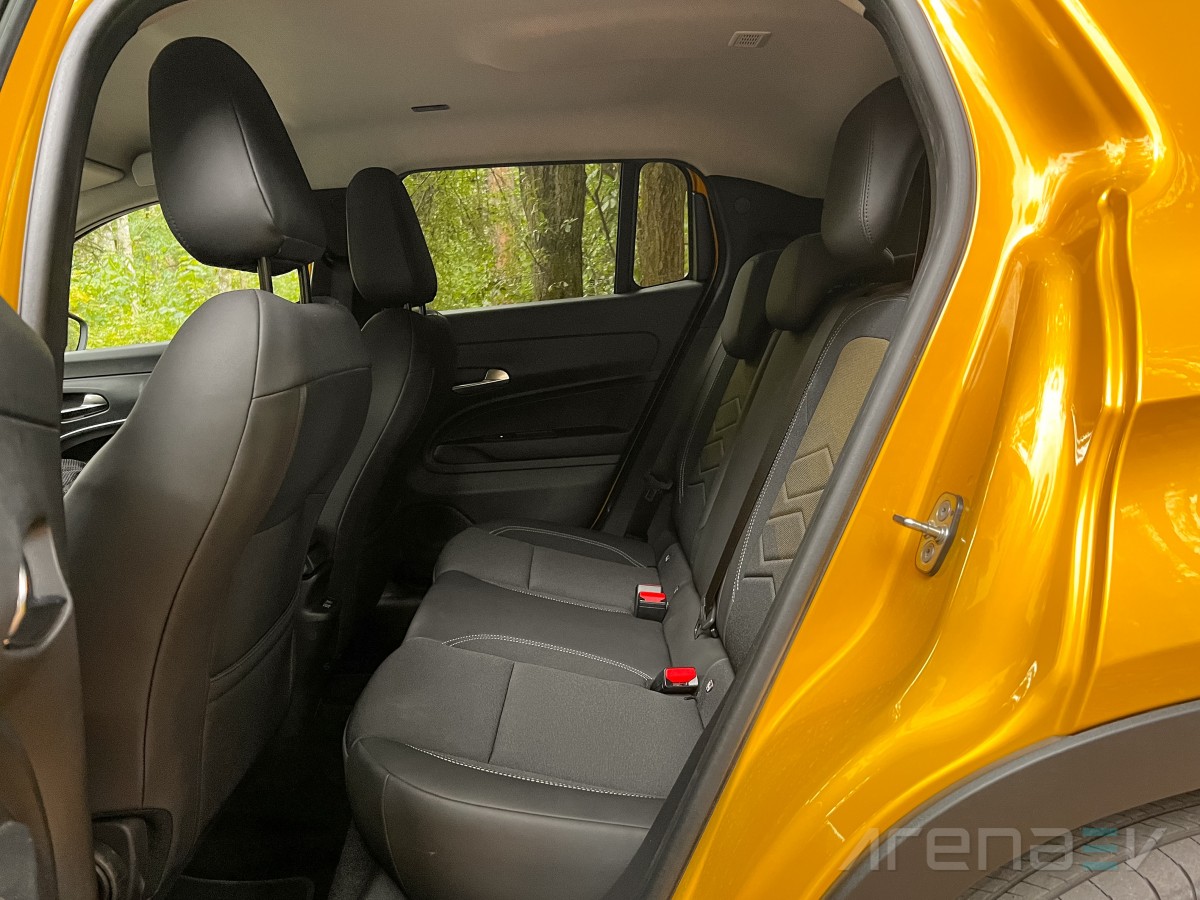
Our reviewer stands at 1.95 m (6’4”) and he barely fits, having to hug the front seat with his legs. On the upside, because of the boxy rear end design there is plenty of headroom.


Legroom is scarce in the back of the Avenger, but the headroom is plentyful.
Storage & practicalities
The trunk of the Avenger is small even when we consider the size of the car. On the plus side, it is very boxy and almost all of its space can be used up. It offers 13.4 ft³ of storage space, but the whole capacity is only accessible if you remove the first trunk floor. That’s right, there is another trunk floor beneath the initial one, which hides some electronics and the tire repair kit, as well as some small storage space.
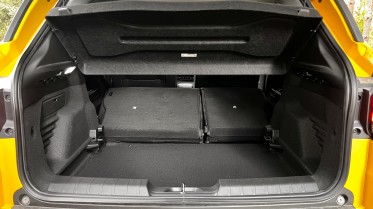
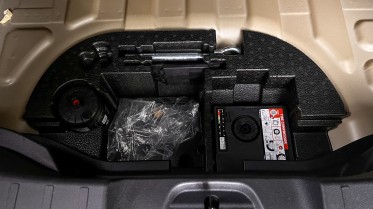
The trunk is not the biggest, but hides some great practicality tricks.
When you fold the rear seats down you get flat storage space with the much more impressive 44.1 ft³ capacity. This is thanks to the boxy design and the high roof, which utilize this space masterfully.
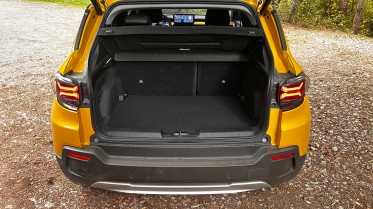
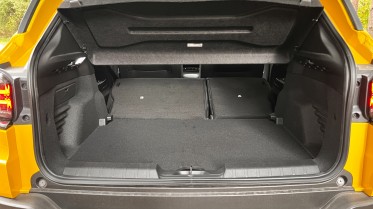
The Avenger can become much more useful due to the movable floor lid.
Inside the cabin, there are hardly any storage spaces for smaller daily items. The door pockets are deep, but narrow, which makes it impossible to fit most water bottles. The center console's deep inserts are about all you get in terms of interior storage.
There is also no frunk (front trunk), to boost the storage space. This is mostly due to the fact that the Avenger is based on an ICE vehicle and the EV counterpart should have a similar layout.
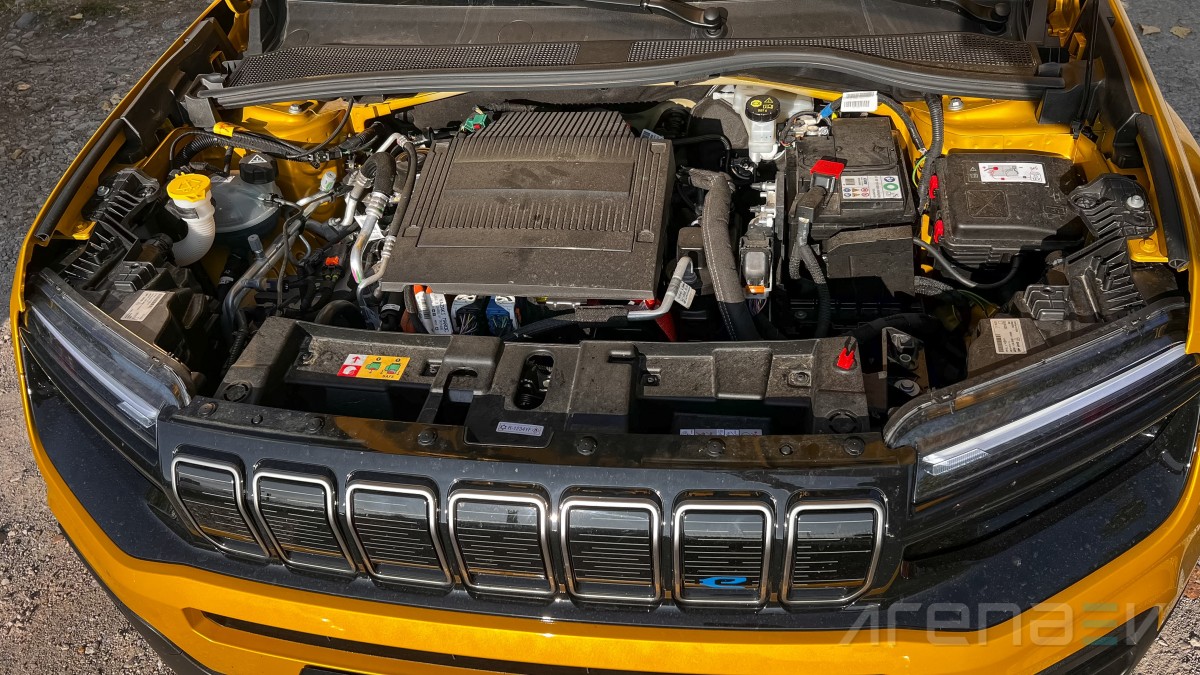
Driving experience
The driver of the Avenger feels comfortable and relaxed. The suspension is soft and goes smoothly over bumps and potholes. It has a lot of travel and therefore the handling in corners is compromised, but that is a something the city-oriented customers will happily live with.
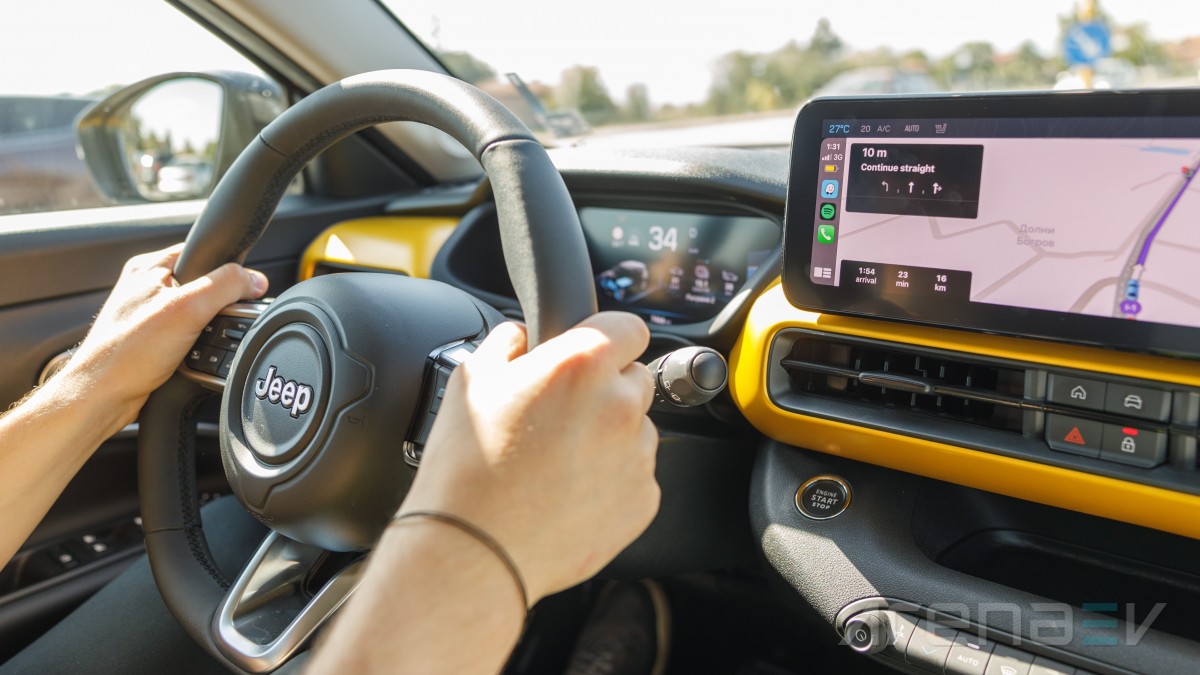
There is a significant amount of body roll, which may cause some nauseousness while driving at higher speeds on the highways or on twisty roads. At the very least it makes for a rather unpleasant experience.
The comfortable driving around the city, on the other hand, is further enhanced by the overly-assisted steering, which gives almost no road feedback, but makes the steering wheel appear feather-light. It can easily be operated with just your fingertips.

The low power of just 115 kW (156 hp) is another thing pointing to a car designed to rarely leave the city limits. The Avenger feels slow every time you try and overtake on the highway. For daily commutes at lower speeds, the Avenger keeps up adequately with traffic. Sadly, there is no option for one-pedal driving.
We had the chance to test the Avenger in very light off-road conditions on a farm. It did well and had no problem clearing small obstacles and rocks, yet the FWD doesn’t inspire much confidence. The small SUV is great for its segment in terms of going off the pavement, but we came to realize the true purpose of its lifted ride is to clear high curbs and massive potholes, which are frequently found in daily life.
There is an AWD version “4xe” coming in the near future, which should be able to offer a bit of extra off-road credibility. but so far we have to content with just one driven axle on the 4e.
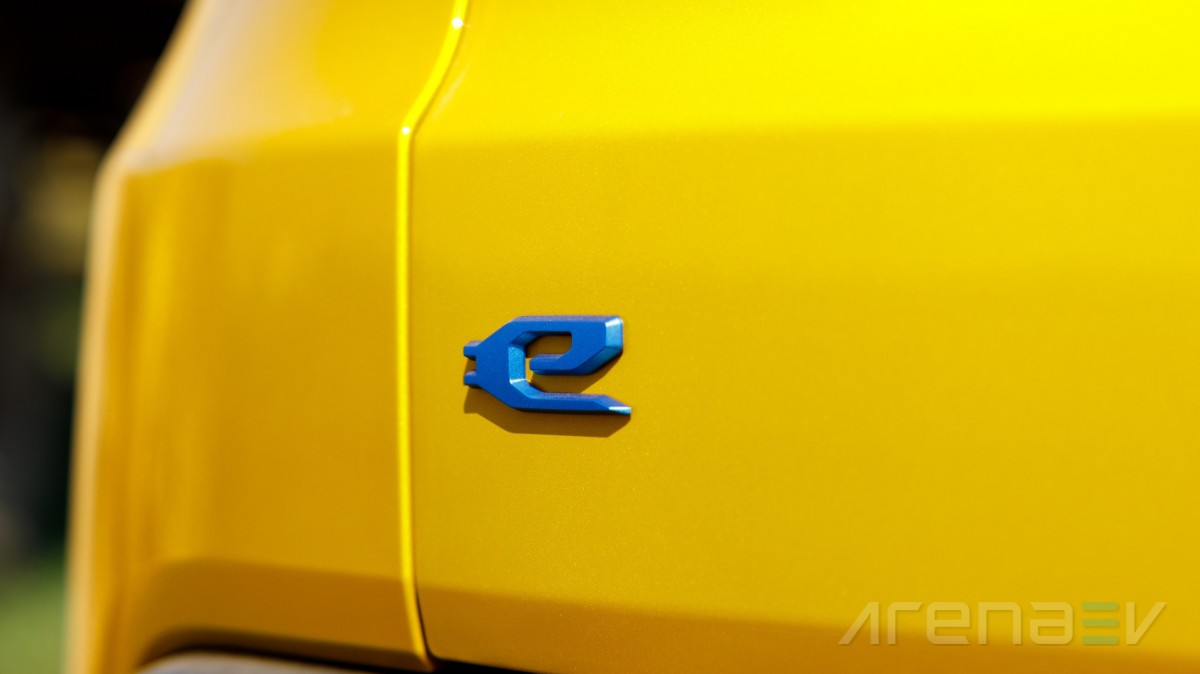
The Avenger comes with sand, snow and mud modes, which re-calibrate the ESP system and change the behavior of the accelerator to better suit the terrain. There are also the standard normal, eco and sport modes, which alter the road behavior. Sport gives you access to all the 156 hp, whereas normal uses 108 hp for a leisurely drive and eco only gives you about half the top output - 81 hp. You should only use this in cases of emergency as it cuts power significantly and also limits your A/C to maximize range.
We should definitely mention that the Avenger behaves amazingly while parking or squeezing through tight gaps. It offers great visibility through the big flat windows and its maneuverability is amazing, allowing it to turning in very small spaces. You can make U-turns basically everywhere without wondering whether you’ll need to reverse to successfully complete the maneuver.
The driving assistants work really well in the Avenger. None of them are invasive while driving and just work as your companions. There are no loud beeps or harsh steering wheel interventions. Sadly, you cannot turn any permanently off if you don't like them.
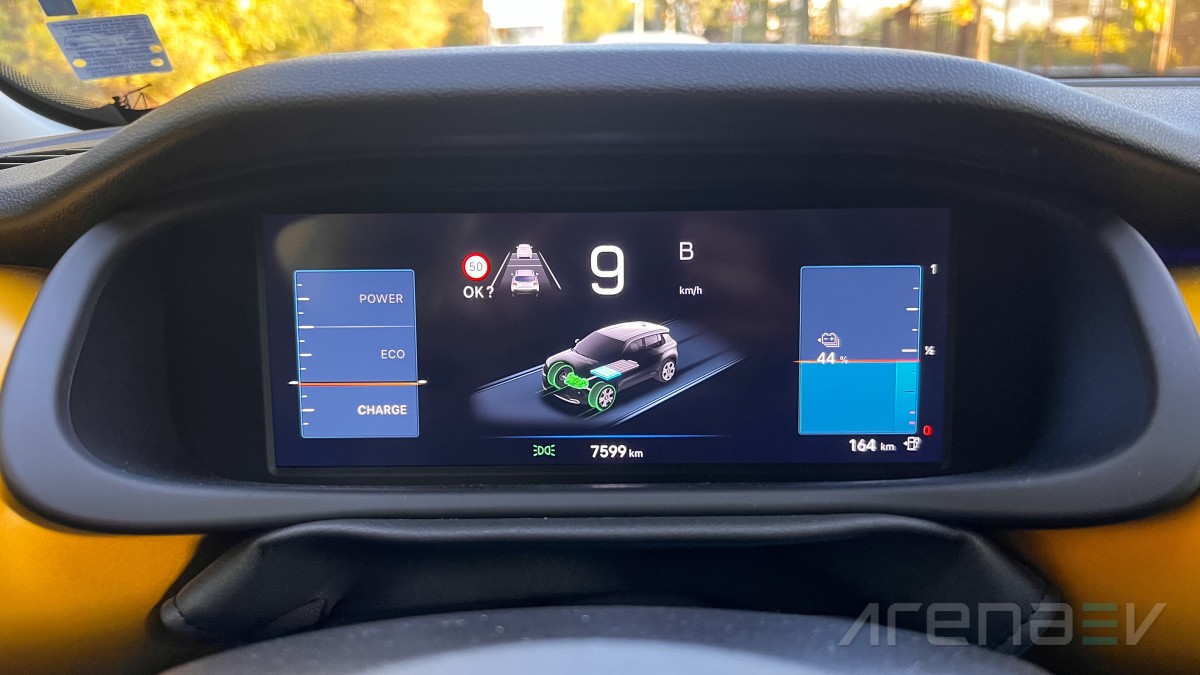
Tech Features
The Avenger has relatively modern technologies implemented, but no groundbreaking new features. It rather utilizes what is currently available on the market and offers it in a great overall package for the driver and passengers to enjoy.

The gauge cluster can show many different menus and types of data, depending on your preferences. It is easy to use with only two buttons controlling it and has great resolution and size of characters.

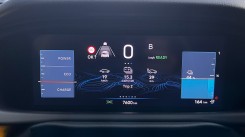
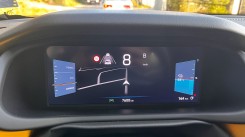
The gauge cluster displays a lot of different useful information.
There is a really peculiar trait in the Avenger, that isn’t present on any other vehicle. That is the sound the turn signals make. They actually deliver a bass tone from the stereo, which makes it impossible to hear them tone whenever you listen to some music. On the other hand, if you are an up-and-coming rap producer, the sound from the turn signals can truly turn into a great baseline for your beats.
The touchscreen center display, which regretfully has quite a significant lag after input and this makes it feel very dated, even though it is a brand new piece. Moreso, the size of the font they have chosen is way too small and you have trouble distinguishing between the different characters, especially while driving. It also incorporates the heated seats controls, which turns a simple procedure into a multiple-step process.
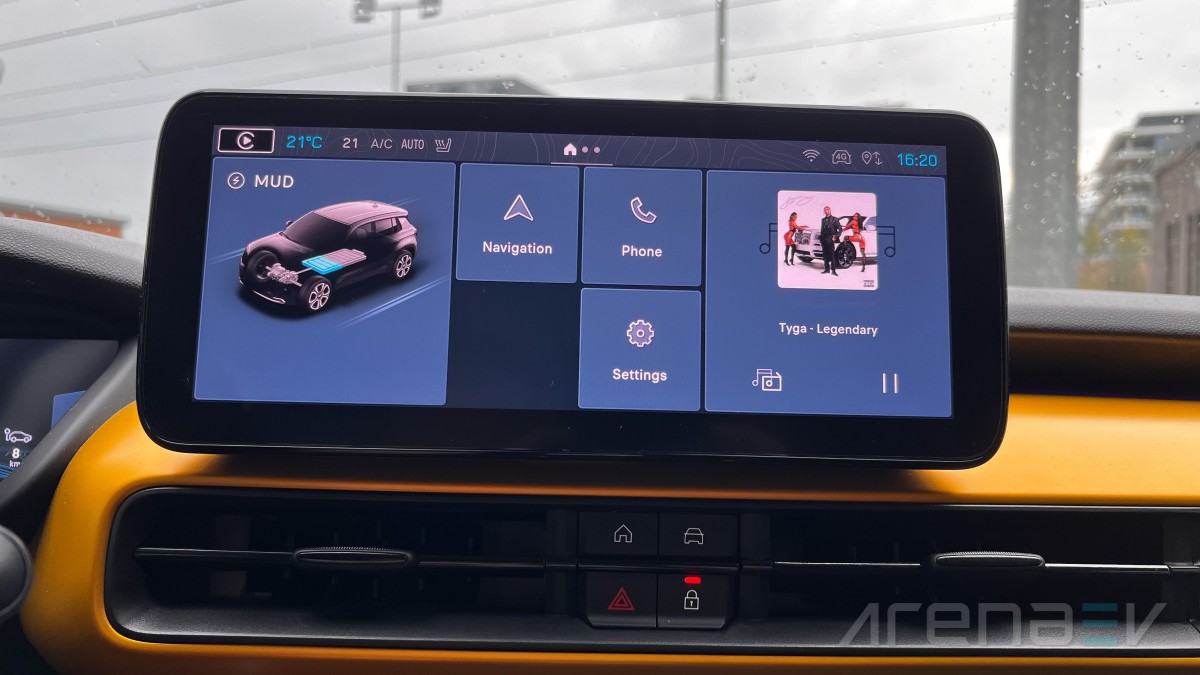
Beyond those gripes, the infotainment system is intuitively laid out and offers support for features like Apple Carplay, Android Auto and many types of connected services.
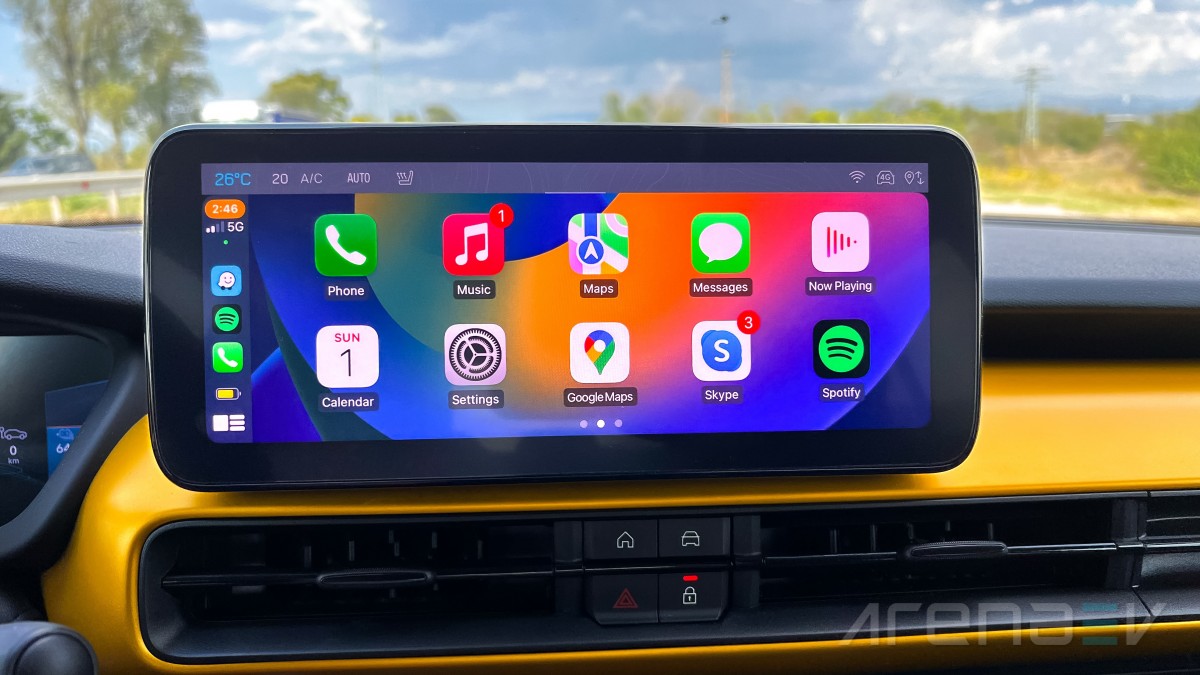
The built-in navigation system is very precise and can plan your journeys with charging stops included. A rather bizarre feature is the fact that you can select what vehicle you’re in and then it asks you to put in your exact dimensions. This seems particularly strange, given the fact that it is a built-in system, which cannot be used in anything else besides that specific Avenger you’re sitting in.
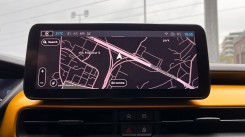
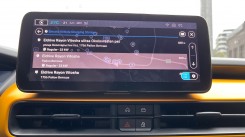
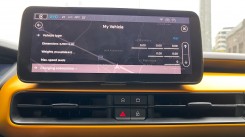
The navigation is precise and has funky features.
A huge thumbs up goes to the rear-view camera, which has amazing quality both at night and during the day. Stellantis has been getting a lot of criticism for the camera quality in all of its vehicles and they have definitely massively improved in the Avenger. It offers a wide angle view, which is helpful not only during parking, but also while backing up out of an alley with low visibility.
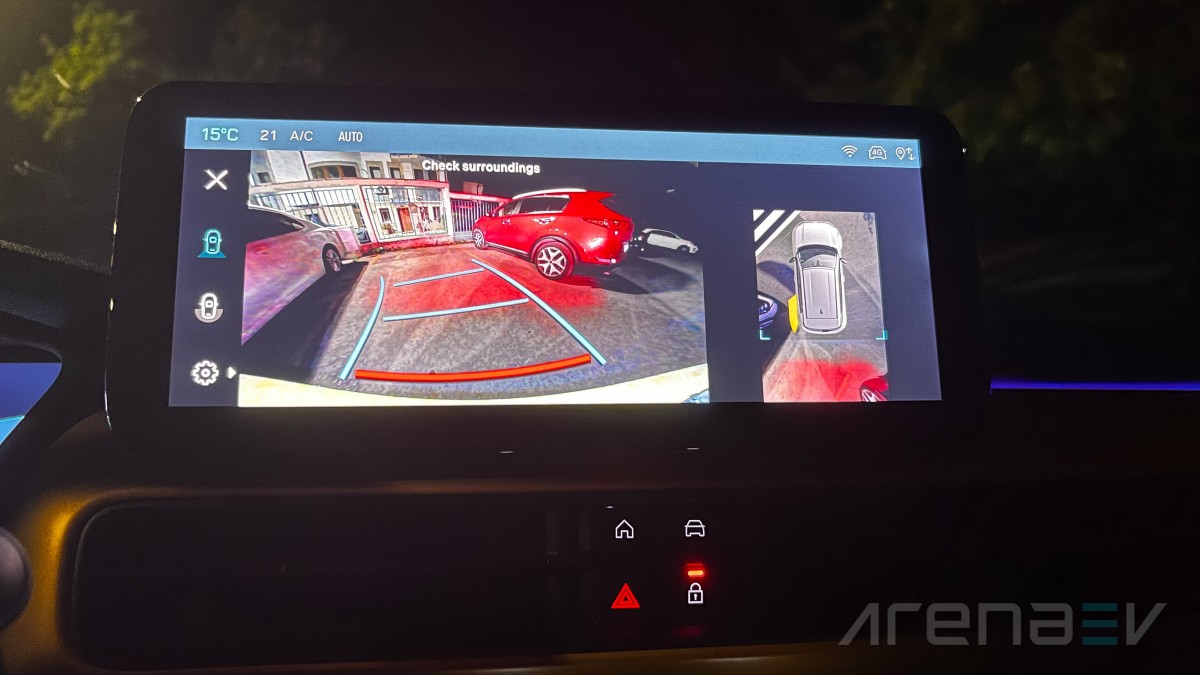
As we previously mentioned, the assist features like lane keeping assist and automatic cruise control work remarkably well in the Avenger. In contrast, the automatic headlights aren't nearly as good. We can hope this is because we used an early unit, which often come with some software problems.
Ride Comfort
The Jeep Avenger offers a very soft ride, which is easily noticeable once you get on a really bumpy road. Small potholes are never felt by the passengers, whereas big uneven surfaces cause you to move in your seat a lot, but not feel as if you are being kicked in back.

Going over our bumpy test track felt great - almost none of the road issues carried over in the cabin. Even on gravel and light offroad conditions, the Avenger remains comfortable and silent inside. But the price you pay is cornering performance and the Avenger really feels like it will fall on its side when cornering at anything above city speeds.
Cabin Noise
The interior of the Avenger features decent soundproofing and at low speeds the cabin remains quiter than even a Tesla Model S.
Yet as you pick up speed, the boxy shape means wind noises become apparent and increasingly bothersome. At 56 mph already matches the Model Y for cabin noise and if you reach 81 mph it even surpasses it.
Sound level tests are carried out with a specialized sound level meter placed in the car's cupholders. The test is conducted with air conditioning and radio off and while maintaining a steady speed.
Acceleration and braking
Smashing the accelerator in a vehicle with just over 150 hp is not exactly a thrilling experience, yet the Avenger outperforms the promises of its specs sheet. The manufacturer states 9.6 seconds for the 0 - 62 mph sprint, but we managed to beat that by over a second, doing it in exactly 8.18 seconds. Some of our colleagues did mention that the the Avenger feels quicker than it should and here's why - it is actually quicker.
Stopping completely from 62 mph takes 36 m (118 ft), which is alright for a small vehicle with small brakes and not a lot of weight. Sadly, after only the first stop the brakes start to overheat and their performance drops significantly. It only took 2 rapid stops to take the breaking distance upwards of 40 m (131 ft).
Consumption
The Avenger is very efficient in daily traffic and can achieve its WLTP rating of 249 miles with more cautious driving. Once again, a downside of the boxy design is the worsened aerodynamic rating, which is quite noticeable when you reach highway speeds. We conducted our testing at 79°F, which is only a few degrees higher than the optimal.
Jeep Avenger Consumption:
| Speed | Consumption | Range |
|---|---|---|
| 37 mph | 6.3 mi/kWh | 323 miles |
| 56 mph | 4.3 mi/kWh | 217 miles |
| 81 mph | 2.8 mi/kWh | 142 miles |
We measure consumption by driving at constant speeds on an identical test route during the day. Testing is conducted with air conditioning, all safety systems and radio on. The data comes from the vehicle's board computer. Specific testing parameters, such as ambient temperature, are mentioned in the text on a case-by-case basis.
Charging speed
The Jeep Avenger charges at 100 kW just as the manufacturer states, however this power is achievable for a very short period of time - until it reaches around 20% charge. After that the maximum charging power drops significantly and once we hit 40% charge we were looking at just 69 kW. These numbers are far lower than what Jeep promises and could mean higher than average waiting at charging stations is you decide to go on a roadtrip with the Avenger.
Competition
Jeep Avenger faces tough competition in the small EV SUV segment, where new models emerge every few weeks. The unique styling certainly make it stand out and the overall performance is solid if your main use is city driving .
If you'd like something a bit more versatile you should have a look at the Renault Megane E-Tech. It offers more interior space, especially for the second row, has better quality of materials and a much more modern infotainment system. The Megane looks much more subdued and even the thought of going off-road will make it sweat, but it delivers far better experience on country roads and highways.
The second alternative worth checking out is the Peugeout e-2008. The two vehicles share a lot of components, including the platform and their drivetrains. However, the Peugeot offers a more luxurious interior, and trades the off-roading capabilities for better efficiency. The Frenchman has better on-board technology and better materials, yet the infotainment interface is far less intuitive.
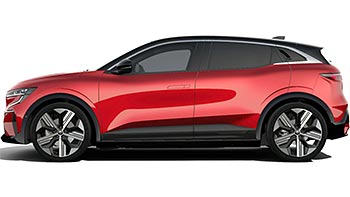
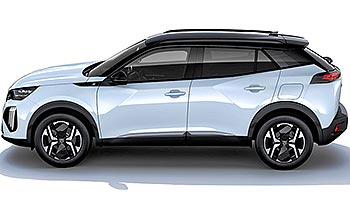
Renault Megane E-Tech 60kWh 2021 - • Peugeot e-2008 SUV 2023 -
Verdict
The brand new Jeep Avenger is a fantastic city-oriented SUV, that happens to have some off-roading capabilities. It is a solid daily commuter that doesn't have major dealbreakers, but also no particular stand-out performances. A city specialist with a stand-out design is what Jeep seemingly set off to achieve and it has pulled it off.
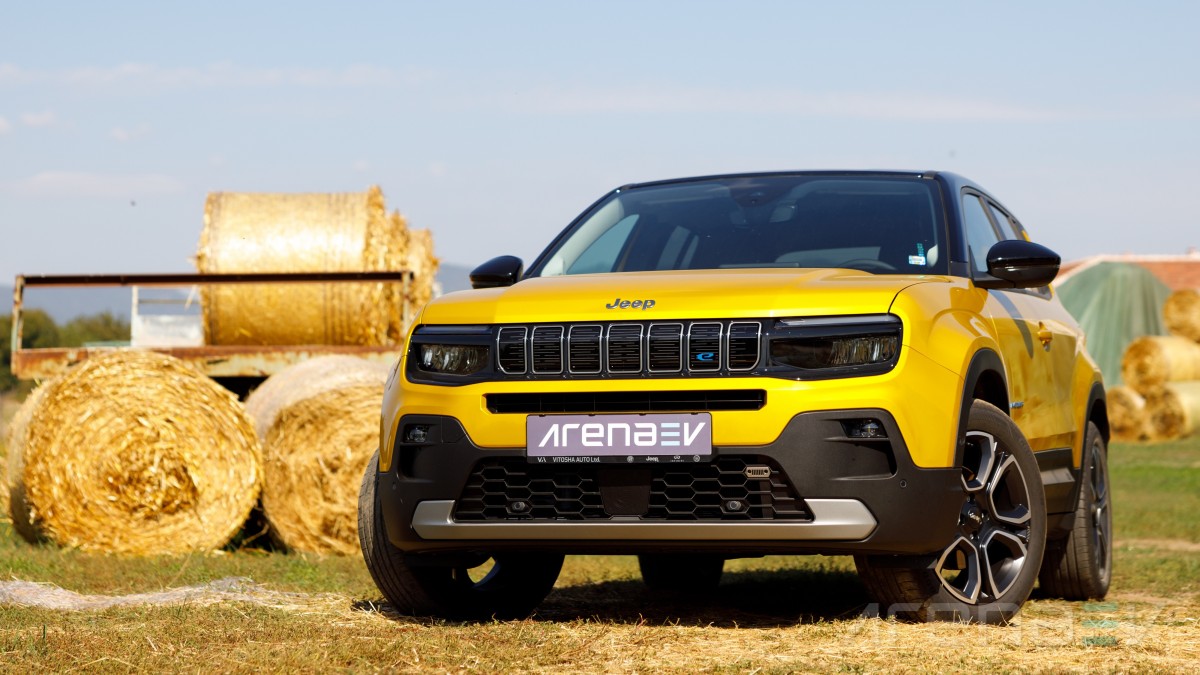
The Jeep Avenger feels best as a daily commuter, delivering a smooth ride over potholes, squeezing in tight parking spaces and turning on a penny. You can then perhaps take your kids to a picnic on the weekend. And it's not looking bland in traffic like most SUVs these days.
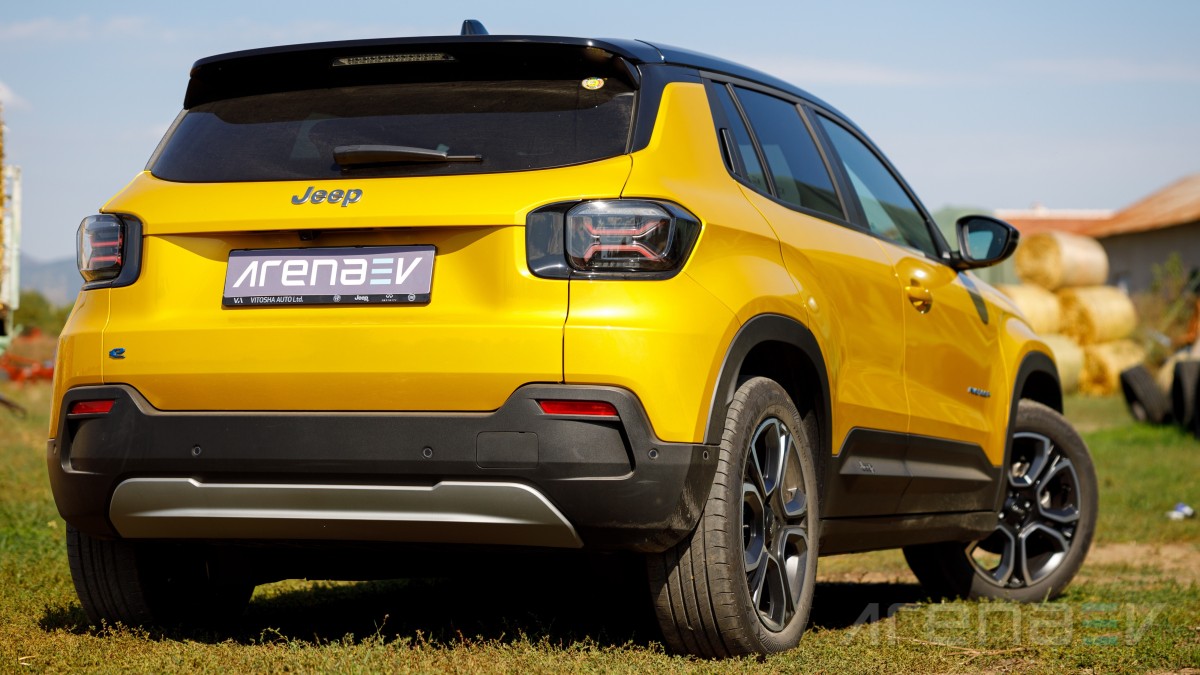
Still, we'd disagree that the Avenger is really the “Car of the Year”. Its highway performance is just too compromised to be a an outright recommendation for everyone. But for the right kind of driver the Avenger is truly the best out there at the moment.
Pros
- Great ride quality.
- Recognizable styling.
- High ground clearance.
- Excellent maneuverability.
- Highly customizable gauge cluster.
- Flat-folding rear seats.
- Notable changes between the different drive modes.
Cons
- Interior material feel cheap.
- The back seats offer almost no legroom.
- Small trunk, no frunk.
- No one-pedal driving.
- You cannot hear the blinkers when listening to music.
Reader comments
- Ellis1
- }ue
Man, this Jeep Avenger is getting all these fancy awards, but are they legit or just some PR stunt? It looks cute, but I think that is about it...
- beau
- x}%
Sacrilegious is the perfect word to describe a tiny, front-wheel drive Jeep. As a hardcore Jeep enthusiast, I'll stick to the good old-fashioned petrol-powered models that have been conquering off-road terrain for decades.
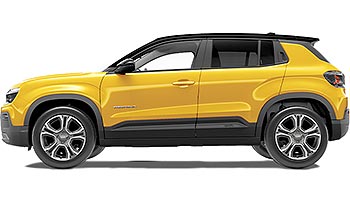





Facebook
Twitter
Instagram
RSS
Settings
Log in I forgot my password Sign up